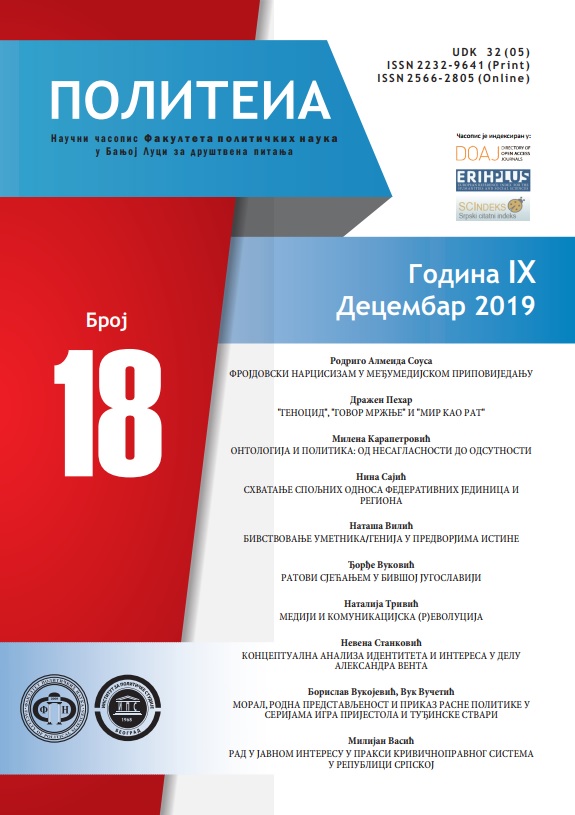ONTOLOGY AND POLITICS: FROM DISAGREEMENT TO ABSENCE. THE POLITICAL PHILOSOPHY OF JACQUES RANCIÈRE AND SLAVOJ ŽIŽEK
Abstract
Understanding the constant transformation of forms of political agency in contemporary age sets a basic requirement for philosophers - to reconsider concepts that seek to theoretically comprehend these changes. Naming, redefining, and rethinking the meanings of classic concepts are not only interventions within the theory, but they also allow for a clearer picture of the future of society and state. This paper demonstrates how philosophers Jacques Rancière and Slavoj Zizek contribute to this research. The emphasis is only on some of the key points of these two theorists that can be used as an illustration of the main themes within contemporary political philosophy and ontology. Rancière emphasises the point of disagreement as the point from which to begin the analysis of the relationship between philosophy and politics, and uses the following terms: politics (space for the theoretical agency) and police (existing political structures). In this way, a new basis for the debate on universal issues - freedom, justice, equality - is constructed. Zizek puts the ‘absent centre of political ontology’ as the main problem, that is, instead of insisting on subjectivation, one should rethink the classic concept of the subject and expose the shortcomings of the earlier definitions of this concept in order to form the basis for new philosophical approaches. Comparing the views of Rancière and Zizek, the author indicates how the production of knowledge and critical thinking can lead to a clearer view of the (political) subject, and its place and role in new redistributions of power in the public space.
References
Aristotel (1975). Politika. Beograd: Bigz.
Badiju, A. (2008). Pregled metapolitike. Beograd: Institut za filozofiju i društvenu teoriju; „Filip Višnjić“.
Baiocchi, G., Connor, B. T. (2013). Politics as interruption: Rancière` s community of equals and governmentality. Thesis Eleven 117(1): 89 – 100. Posjećeno 15. 10. 2019. URL: https://journals.sagepub.com/doi/abs/10.1177/0725513612460342.
Batler, Dž. (2012). Psihički život moći. Teorije pokoravanja. Beograd: Centar za medije i komunikacije; Fakultet za medije i komunikacije Univerzitet Singidunum.
Goše, M. (2004). Demokratija protiv same sebe. Beograd: „Filip Višnjić“.
Hegel, G. V. F. (1989). Osnovne crte filozofije prava. Sarajevo: „Veselin Masleša“; „Svjetlost“.
Laclau, E., Mouffe, C. (2001). Hegemony and Socialist Strategy. Towards a Radical Democratic Politics. Second Edition. London and New York: Verso.
Laclaua E. (2007) Identitet i hegemonija: Uloga univerzalnosti u konstituiranju političke logike. U J. Butler, E. Laclaua i S. Žižek. Kontigencija, hegemonija, univerzalnost. Suvremene rasprave na ljevici. Zagreb: Jesenski i Turk.
Rancière, J. (2008). Mržnja demokracije. Zagreb: Naklada Ljevak.
Ransijer, Ž. (2014). Nesaglasnost: politika i filozofija. Beograd: Fedon.
Žižek, S. (2003). Sublimni objekt ideologije. Zagreb: Arkzin.
Žižek, S. (2006). Škakljivi subjekt: Odsutni centar političke ontologije. Sarajevo: Šahinpašić.
Žižek, S. (2007). Držanje mjesta. U Butler J., Laclaua E. i Žižek S. Kontigencija, hegemonija, univerzalnost. Suvremene rasprave na ljevici. Zagreb: Jesenski i Turk.
Žižek, S. (2008). Paralaksa. Zagreb: Antibarbarus.
Copyright (c) 2019 Politeia

This work is licensed under a Creative Commons Attribution 4.0 International License.
Autori koji objavljuju u ovom časopisu pristaju na sljedeće uslove:
- Autori zadržavaju autorska prava i pružaju časopisu pravo prvog objavljivanja rada i licenciraju ga "Creative Commons Attribution licencom" koja omogućava drugima da dijele rad, uz uslov navođenja autorstva i izvornog objavljivanja u ovom časopisu.
- Autori mogu izraditi zasebne, ugovorne aranžmane za neekskluzivnu distribuciju članka objavljenog u časopisu (npr. postavljanje u institucionalni repozitorijum ili objavljivanje u knjizi), uz navođenje da je članak izvorno objavljen u ovom časopisu.
- Autorima je dozvoljeno i podstiču se da postave objavljeni članak onlajn (npr. u institucionalni repozitorijum ili na svoju internet stranicu) prije ili tokom postupka prijave rukopisa, s obzirom da takav postupak može voditi produktivnoj razmjeni ideja i ranijoj i većoj citiranosti objavljenog članka (Vidi Efekti otvorenog pristupa).

